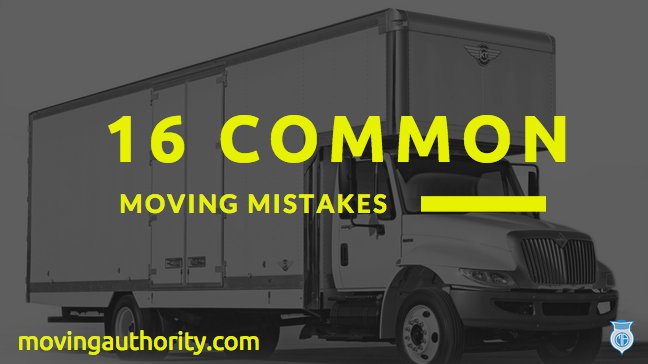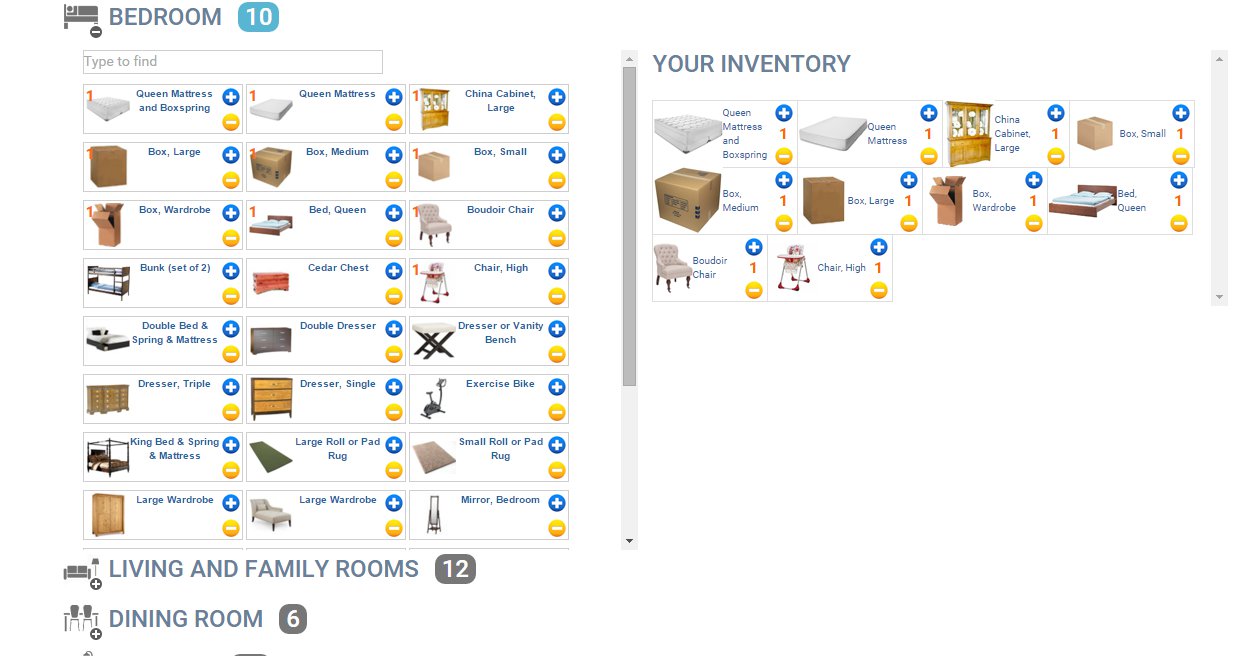16 Common Moving Mistakes Questions You Need to Ask Your Mover

- How Can You Navigate the Moving Industry?
- Investigating Their Background
- Reviews, Testimonials, Big Organizations
- Verify Their License & Insurance
- A Short Guide: Checking A Companies' DOT Number
- Budgeting Isn't Fun But It's Necessary
- Use Your Budget to Create A Moving Timeline
- Remember What Type of Move You're Making
- Precautions & Preventative Measures
- Worker's Compensation - It Can Happen!
- What Protective Measures Are Used?
- Understanding Their Claims Process Is Necessary
- Where's My Stuff?
- What is a Moving Delivery Window?
- Avoid Rogue Movers & Scams!
- Communication is Key to a Successful Move
1. How Can You Navigate the Moving Industry?
The moving industry can be quite difficult to navigate, particularly from the eyes of the consumer (i.e. customer or client). Without a doubt, people throughout the entire U.S. are looking to move but find themselves stuck in a rut. Typically, people are not aware of what to look for in a reputable and trustworthy moving company. There are always at least 15 moving industry details you need to know that is essential to choosing the right moving company.
2. Investigating Their Background
One of the first questions that all customers should inquire about is how long the company has been established, licensed, and operating legally. True, it isn't fair to discredit good moving companies out there who haven't been around as long as others, but it does give you a reason to simply look further into their background and experience in the industry. It's important that you feel you can trust that your moving company will treat your belongings with the respect they deserve.
3. Reviews, Testimonials, & Big Organizations
There are a few ways to check a moving company's credentials, all easily accessible and available online. First, you always want to read through other customer's reviews. Whether they are good or bad, they are sharing their experience with others who are looking into the same company. Sometimes these can be enlightening and informative while other can describe rather surprising experiences.
Another way to check their credentials is to blatantly ask them to provide you with some other sort of legal or legitimate proof in addition to reading testimonials. References in this regard would indicate a higher level of professionalism within the moving industry. The Better Business Bureau (BBB), for example, and the American Moving & Storage Association (AMSA) are both two highly respected professional organizations. Each organization will be able to give some insight as to how respectable the specific moving company's reputation is. If you inquire and they give you a less than average reference, clearly you would like to keep looking for a reputable company that's confirmed by both its customers as well as reputable organizations.
4. Verify Their License & Insurance
Checking whether the company you would like to use is licensed is one of the most important aspects of a moving company. Without a license, the moving company is performing moves illegally and should absolutely not be trusted with your belongings. They will not hold themselves accountable for any damages or losses to your items. A typical carrier should at least ensure 60 cents per pound. This is something we would call rogue movers or scam movers.
5. A Quick Guide: Checking A DOT Number
In order to verify their legality, you will need to check their U.S. DOT number. This number is given by the Department of Transportation to let both other carriers and shippers know that they are operating legally. By checking their DOT number and ensuring that it is a legitimately well-run business, a sense of trust begins to build between the moving company and the customer.
Now that you’re aware of the importance of the DOT number and what kind of information you can take from it, you need to know how to look any moving company’s DOT number within the system. This is the easy part. First, you will need to visit the safer.fmcsa.dot.gov website. This should take you to a page that allows you to search by DOT number, MC number, or company name.
Enter the company name and:
- If nothing comes up for that company, they are not operating legally and you should not trust them with your beloved items
- If the company does come up, you will be able to see all of the information, including the DOT number. This is an indication that the company is operating legally under the DOT’s regulations
- If the company comes up, has a DOT number, but says it is NOT AUTHORIZED, be wary of that company. They will need to complete the necessary paperwork for their company to become operational.
6. Budgeting Isn't Fun, It's Necessary
Creating a Budget isn’t something new to consumers, especially those who have already moved once, or even several times in their life. We strongly recommend sitting down and calculating your costs yourself. Next, try to create a moving timeline that you can align with your budget. This is a great way to stay organized and not ‘accidentally’ go over your financial means.
7. Use Your Budget to Create A Moving Timeline
Once you’ve determined a rather solid budget and moving timeline, you will want to obtain some estimates from any of the potential companies you’re still looking at (the ones that have made it past the above requirements essentially). Affordability is a big factor that shippers are looking for in a company. This leads you to online quotes and estimates companies provide. At Moving Authority, we cannot say enough times that you should inquire about at least 3 accurate estimates all in the same day.
Remember to keep in mind that when you are trying to get an estimate, you MUST provide the moving company with all aspects of your move. This would include (but not be limited to: how many boxes, if you have to go up stairs or an elevator, how many rooms, valuables, liquids, etc. These are all just a few examples of things that must be communicated to the company in order for them to give you the most accurate estimate.
8. Remember What Type of Move You're Making
It’s always good to keep in mind what kind of move will you be engaging in. Is it an office relocation, corporate, residential, executive, interstate, local, long distance etc.? There are a plethora of different types of moves, so it important to identify your specific and unique move. It is particularly important to pay attention to:
- Long Distance / Interstate - these moves charge by the weight of your shipment & is why we suggest getting rid of unnecessary or unwanted items, especially those that are bulky, such as furniture
- Local / Intrastate - these moves are generally charged by an hourly rate (i.e. how many hours did it take to complete your move)
- International - although it seems challenging, these moves charge by the shipment’s volume typically
Detail such as these is exceptionally helpful when discussing aspects of a move as it can be very informative and educational. The more you know and understand, the better the chances you have of picking a reputable moving company that you can trust and is right for you.
--While your on the phone with a mover, this is also a chance to question them about any extra fees, policies, and to find out what items they don’t accept--
9. Precautions & Preventative Measures
No one is interested in moving into their new home with scuff marks, scrapes, or any other damages that can result from moving. Take the time to discuss with your company how they plan to move your belongings and large items, such as furniture, in without damaging the new home. How do they plan to do this? What kind of supplies will they use? What about protective covering? These are just a few of the many questions you can ask the mover about the ways in which they plan on protecting your new home. If you aren’t satisfied with their precautions, speak up and let them know so they can plan for further protection. If they can’t, you have the simple choice of choosing elsewhere.
10. Worker's Compensation - It Can Happen!
Worker’s compensation is something that most adults are familiar with, especially those who have been employed and hurt due to a work related accident. In the moving industry, worker’s compensation is something that you actually have to worry about. You should question whether or not they provide insurance or worker’s compensation. This is important to note due to the fact that should something happen to a worker during your moving process, and the company provides neither insurance nor compensation, then you may be held liable for any potential injuries that occur on your property.
11. What Protective Measures Are Used?
If you’ve read through all of these steps to safeguard your move, then you will definitely want to be aware of how the moving company plans on managing your household goods. In this industry, there is no need to fall victim to silence questions. You are entitled to understand how they plan on handling and protecting your belongings throughout the actual moving process. It is important to know this in advance, however, if you are using a professional and reputable moving company, they generally they do a solid job protecting your items.
Some suggested questions you might ask:
2. What precautions will you take?
3. What’s involved with your insurance policy?
4. What happens if something is damaged?
All of these questions should be easy for the mover to answer on the spot. If they are not, I would be wary of the company and proceed by doing some further research, particularly by reading reviews to see if other customer’s belongings have been damaged
12. Understanding Their Claims Process
It is vitally important to understand the way the moving company handles claims. For example, if something of yours is damaged, you can file a claim. However, each company is unique in this particular area which is why inquiries in this regard generally come from the customer. Of course, we always hope that nothing is damaged, and many companies feel that way as well, but sometimes life happens. Be prepared by knowing what their claims policy is or how they handle claims (in-house, 3rd party, etc.)
13. When Will I Get My Stuff?
One of the first but also the last questions people ask movers is regarding what time they will receive their things. Of course, this is a completely legitimate question, although this is where many miscommunications happens between moving companies and their customers. Delivery part of the framework for moving, but that does not mean you will get your belongings delivered exactly when you want them. For the most part, you can ask the professionals when the delivery date will be, though during the busy season/months, having your things delivered on an exact date isn’t likely.
14. What is a Moving Delivery Window?
If the moving company you choose is very busy, you should either be prepared to book it months in advance or prepare for a moving window delivery time. A moving window delivery time will essentially let you know that your goods will be delivered between Day A and Day B. This is no fault of the company, this is simply their way of letting you know that they cannot guarantee a specific date.
15. Avoid Rogue Movers & Scams!
All of these questions factor into what makes a moving company right for you. Hopefully, these tips will encourage you to be more knowledgeable about what you want from your move and your moving company. This type of insight will help you choose a company that fits your prerogative. Speaking with professional movers can be beneficial for your move now, as well as for any future move you may have as well. Don’t let your moving experience suffer due to illegal, scamming, and rogue movers. By following this guide, you have tools to protect yourself from scams.
16. Communication is Key to a Successful Move
At Moving Authority, our goal is to help both carriers and shippers to reach their goals. We encourage communication, trust, and accuracy in each and every move. If you aren’t quite sure where to start, you can check out our comprehensive list of top reputable and trustworthy movers, both long distance and local moving companies to choose from. If you are working with a professional moving company, you should expect professional service that you feel comfortable with and trust to relocate your home.


Add Comment